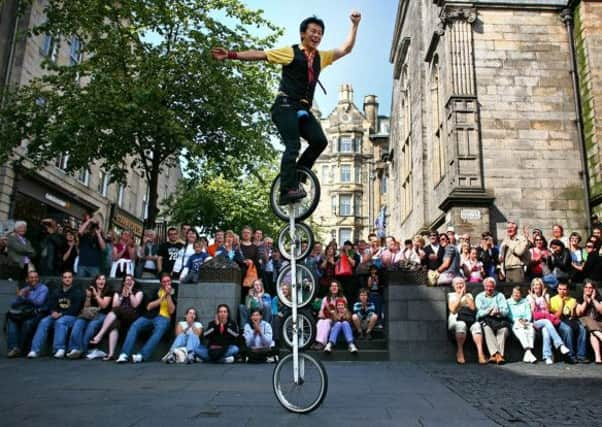Lloyd Anderson: New centre will give us soft power


During a week in which the white paper and the tragic events in Glasgow filled the news, you may well have missed the launch of the Centre for Cultural Relations; the world’s first centre for excellence for teaching and research in cultural relations, to be based at the University of Edinburgh.
The city is a fitting home for the Centre when you consider the renown of Scotland’s capital in the realms of culture and learning and its reputation as perhaps the greatest cultural festival city in the world.
Advertisement
Hide AdAdvertisement
Hide AdIn the 21st century, nations are increasingly looking to cultural relations or “soft power” rather than hard power – the use of force – to influence international affairs. Foreign policy makers need to understand the importance of soft power and how best to use it, as we know it has significant influence on the world stage, ultimately translating into economic benefits.
A country’s soft power is its ability to make friends and influence people not through military might, but through its most attractive assets – notably culture, education, language and values. In short, it’s the things that make people love a country rather than fear it; things that are often the product of people, institutions and brands rather than governments.
We need to understand how it works, how we might get better at it, and what we want to achieve through its use. We also need to understand the connections between hard and soft power because the apparently rigid distinction between them is an over-simplification. The two forms of influence have always been non-exclusive and overlapping.
Scotland and the UK as a whole are now in a hotly contested race for soft power supremacy across the globe. China, Germany, Japan, Canada and Australia are investing heavily in cultural relations, and while we remain near the top of the list our influence has slipped somewhat in recent years as government budgets have been re-prioritised. Building strong international relationships and trust between countries through arts, sport, education and language is essential, as we address global challenges and strive to make a more secure and prosperous world for all.
Independent research commissioned by the British Council has clearly shown that cultural activities and exchange with other countries help to build trust and so increase levels of interest in business and trade. By focusing on young, educated and dynamic people in key countries around the world – the future global leaders and international traders – cultural exchange puts in place the connectedness that then increases people’s propensity to do business with us. It is encouraging, when you put Scotland under the microscope, that it has so much going for it in the international order.
In arts, Scotland maintains pre-eminence through the Festivals. In sport, we are beginning to realise how transformational the Commonwealth Games could be. In education, with a clutch of world class universities, recent findings suggest our higher education system is the top worldwide destination for overall learning satisfaction. But we cannot rest on our laurels, and in modern languages we need to do better, particularly when one considers that 75 per cent of the world’s population do not speak English.
Together with the Scottish Government, in the wake of last year’s Culture Summit we supported a study to examine the feasibility of having a cultural relations centre here in Scotland. The study identified a gap in the market for teaching and research and the need for a centre to help drive soft power thinking in the future. The centre will introduce a Masters course which includes student placements, alongside professional training, secondments and commissioned studies; all of which will help to cement the importance of cultural relations in combatting barriers and misunderstanding between nations, and facilitating the mutual exchange of knowledge, ideas and information.
Increasing connectivity due to internet penetration and the rise of social media has changed the cultural relations landscape. The paradigm is no longer one of national broadcasting agencies speaking truth to vast audiences who tune in at fixed times; but individuals speaking of their own experiences to other individuals or communities. These new networks pose a challenge to traditional forms of cultural relations, while offering huge opportunities at the same time.
Advertisement
Hide AdAdvertisement
Hide AdThe “network society” is one where the main social structures and activities are organised to process electronic information. But it is not just technology that defines the network society; equally important are the cultural, economic and political factors. Unpicking these new ways of organising society is something the centre will hopefully look at, alongside concepts such as “connected difference”; generating combinations of people that cut across organisational boundaries and leave behind new relationships between previously separate individuals and groups. A dedicated academic centre will undoubtedly help us navigate the socio-economic and political backdrop that exists internationally and how we take advantage of possibilities and make them work for us. The argument for engagement outside our borders has never been stronger and we are confident the Centre for Cultural Relations in Edinburgh will help us understand soft power better, and allow us to work out how to convert it into what commentators have termed “smart power”. If we can achieve that goal, our place at the top table of cultural relations’ could be assured.
• Lloyd Anderson is country director of British Council Scotland